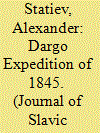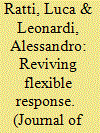|
|
|
Sort Order |
|
|
|
Items / Page
|
|
|
|
|
|
|
| Srl | Item |
| 1 |
ID:
167785


|
|
|
|
|
| Summary/Abstract |
Despite the fact that academia was already aware of the reality of Stalin’s preparation of a Third World War,1
1 ‘Osmyslennoe dvizhenie k Armageddonu. Podgotovka Tret’ei mirovoi voiny v prikazakh voennogo ministerstva SSSR, 1946–1953’, translated by Dr. Harold S. Orenstein, Leavenworth, KS.
View all notes
2
2 V. Zubok, A Failed Empire: The Soviet Union in the Cold War from Stalin to Gorbachev (Chapel Hill, NC: University of North Carolina Press 2009) p. 85; A. J. Levine, Stalin’s Last War: Korea and the Approach to World War III (Jefferson, NC: McFarland 2005); K. Zakoretskii, Tret’ia mirovaia voina Stalina [Stalin’s Third World War] (Moscow: Iauza-Press 2009); M. Weiskopf, Pisatel’ Stalin [The Writer Stalin] (Moscow: NLO 2001) p. 83; B. S. Ilizarov, Tainaia zhizn’ Stalina. Po materialam ego biblioteki i arkhivy [Stalin’s Secret Life. According to Materials From His Library and Archives], 2nd ed., corrected and supplemented (Moscow: Veche 2003) p. 459; Istorija Rossii XX vek. Epokha stalinizma (1923-1953) [History of Russia in XX Century. Stalin’s Epoch (1923–1953)]. Vol II., ed. by A. B. Zubov. (Moscow: Izdatel’stvo ‘E’ 2017) pp. 610–744; V. Afiani, A. Fursenko. ‘Stalin khotel voevat’ s SShA. Tol’ko ego smert’ predotvratila Tretju mirovuji’ [Stalin Wanted War with the USA. Only His Death Prevented WWIII], Novaja Gazeta, N 15, 27 February 2003, p. 10.
View all notes
until today no coherent answer has been given to the question about whether his decision was unprompted, made in accordance with the situation at the end of the 1940s (the Communist victory in China), or simply the incarnation of a long-term plan. The collection of orders from the USSR’s War Ministry spanning the last eight years of the Leader’s life provide grounds for leaning toward the version of continuity of this development of events, which was interrupted only by the death of the despot in 1953.
|
|
|
|
|
|
|
|
|
|
|
|
|
|
|
|
| 2 |
ID:
167783


|
|
|
|
|
| Summary/Abstract |
This article examines the Dargo expedition, an episode of the Caucasus War waged in 1817–1864 by Russia against the tribes of the North Caucasus. In 1845, Tsar Nicholas I ordered a raid in the depth of the mountains controlled by rebels led by imam Shamil. The expedition, targeting the village of Dargo, Shamil’s residence, was to lure the tribesmen into a decisive battle, which the Russians were expected to win and thus destroy the protracted insurgency. However, the expedition ended in a spectacular failure, because its planners ignored the challenges of mountain warfare. The article focuses on these challenges and shows how the rebels’ skill in mountain warfare triumphed over the great superiority in numbers, firepower, and discipline enjoyed by the Russians.
|
|
|
|
|
|
|
|
|
|
|
|
|
|
|
|
| 3 |
ID:
167782


|
|
|
|
|
| Summary/Abstract |
This article focuses on the evolution of the narrative of the Munich Myth, which interprets the Munich Conference and the capitulation of Czechoslovakia in 1938, as it was constructed and distributed by state authorities in Czechoslovakia, and later the Czech Republic, between 1945 and 2015. The article frames the evolution of the narrative in the context of political and social changes to examine how deeply such changes affected the narrative. The results demonstrate that changes in external conditions projected remarkably into the evolution of the narrative. However, the key message of the Munich Myth — the message of Czech smallness, which determined not only defeatism in this particular case but also general passivity in IR — endured, basically intact, for 70 years.
|
|
|
|
|
|
|
|
|
|
|
|
|
|
|
|
| 4 |
ID:
167781


|
|
|
|
|
| Summary/Abstract |
The aim of this article is to explain the presence of Georgian foreign fighters on both sides of the conflict in Ukraine and, using open sources, to map in the greatest possible detail their involvement in this conflict. Since this involvement has taken various forms and continues to do so, the author decided to split the main part of the article into three sections, in which he successively analyses the Georgian National Legion fighting on Ukraine’s side, the engagement of other Georgians on the Ukrainian side but outside the Legion, and the activities of Georgian foreign fighters who have sided with the pro-Russian separatists.
|
|
|
|
|
|
|
|
|
|
|
|
|
|
|
|
| 5 |
ID:
167786


|
|
|
|
|
| Summary/Abstract |
This article focuses on an analysis of the culture of memory that has developed in contemporary Russia. At the center of the research are the biographies of former collaborators who took part in Nazi crimes and then, after the liberation of Soviet-occupied territories, were mobilized into the Red Army and subsequently performed exploits honored by awards. Information that these men were arrested by the NKVD after the war can be found in their personal files, which are not accessible to the broad public. Instead, the fact of their awards and a brief description of their exploits can be found on the site ‘Podvig Naroda’ [Exploits of the People], which has open access. The state memory policy in contemporary Russia, as in the Soviet era, is aimed at emphasizing the heroism of Red Army soldiers; their criminal activities remain in the shadow of the medals they received.
|
|
|
|
|
|
|
|
|
|
|
|
|
|
|
|
| 6 |
ID:
167784


|
|
|
|
|
| Summary/Abstract |
The Battle of Kursk occupies a special place in the history of the Second World War. It is unique not only for its enormous influence on the victory of the Soviet Union and the entire anti-Hitler coalition over Nazi Germany, but also for the three-month ‘quiet’ period during which the opposing sides prepared for it. In the opinion of many historians, Soviet intelligence at this time played a most important role in the planning of combat operations.
|
|
|
|
|
|
|
|
|
|
|
|
|
|
|
|
| 7 |
ID:
167780


|
|
|
|
|
| Summary/Abstract |
This article reviews NATO’s embrace of a new political and military strategy toward the Soviet Union in the second half of the 1960s and seeks to determine whether the tools that were singled out then in the debate over strategy could help overcome the current stalemate between the Alliance and the Russian Federation. Between 1967 and 1969, NATO adopted the Harmel Report and embraced the doctrine of ‘flexible response’ to retain relevance in a rapidly transforming international system. At 70, the dynamics faced by the Alliance place NATO at a similarly critical juncture. A rekindled strategy of 'flexible response' might help the Alliance preserve a premier role in Euro-Atlantic security and strike a durable arrangement with Moscow.
|
|
|
|
|
|
|
|
|
|
|
|
|
|
|
|
|
|
|
|
|